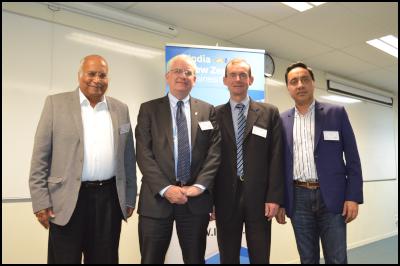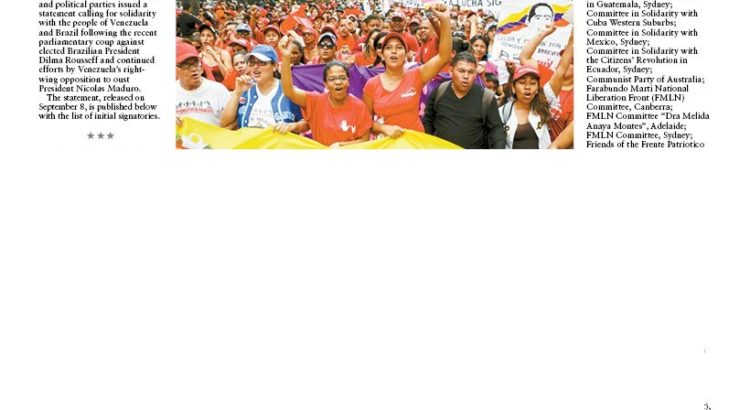Oceanía/Nueva Zelanda/Octubre de 2016/Fuente: Scoop Independent News
RESUMEN: El discurso titulado, «India y Nueva Zelanda relación internacional de la educación – el crecimiento, oportunidades y desafíos», se habló sobre la reciente crisis que la industria se enfrenta a la educación, en relación con las deportaciones de estudiantes de la India y es secuela de la industria. Charles dijo que este problema, no sólo se limita a la India y otros países también se han enfrentado a problemas similares. «Creo que es importante reconocer en esta etapa también que Nueva Zelanda no está sola ante los problemas de fraude en la visa de estudiante y el comportamiento del agente deshonesto. Los Estados Unidos, Canadá, Australia y otros países de todo frente a los mismos desafíos «. «Las tasas de disminución de visado de la India son evidencia de un esfuerzo significativo por Inmigración de Nueva Zelanda para gestionar los estudiantes y los agentes que presenten información falsa y engañosa en las solicitudes de visado. Inmigración de Nueva Zelanda está haciendo mucho trabajo para educar a los proveedores acerca de la selección de los estudiantes, y la necesidad de gestionar sus redes de agentes «.
Education NZ to focus on ‘high-quality’ students, to maintain high standards across New Zealand’s international education industry.
“All of us have a collective responsibility to ensure the experience of our international students is a positive one and results in positive outcomes for them and ultimately for our businesses and New Zealand society and economy. We welcome international students who come here with genuine intent and means. But New Zealand, like any sovereign country, will take steps to protect our borders and deal decisively with fraudulent or unlawful behaviour when we see it.”
This was one of the main sentiments arising out of the address of Education NZ Chair, Charles Finny, when he addressed the members of the India New Zealand Business Council on Wednesday 5 October. The event was hosted by Auckland Institute of Studies.
The speech titled, «India-New Zealand international education relationship – growth, opportunities and challenges», spoke about the recent crisis that the education industry is facing, with regard to the Indian student deportations and it’s aftermath in the industry.
Charles said that this problem, is not only confined to India and other countries have also faced similar issues. “I think it’s important to acknowledge at this stage too that New Zealand is not alone in facing issues of student visa fraud and dishonest agent behaviour. The United States, Canada, Australia and other countries all face the same challenges.”
“The visa decline rates from India are evidence of a significant effort by Immigration NZ to manage students and agents who submit false and misleading information in visa applications. Immigration New Zealand is doing a lot of work to educate providers about student selection, and the need to manage their agent networks.”
According to Mr. Finny, The New Zealand government agencies earlier are working closely together on these issues, to ensure all international students are treated fairly and are well cared for – that they feel welcome, are safe and well, enjoy a high-quality education and are valued for their contribution to New Zealand. This joint-agency work on international student wellbeing has focused in recent months on Auckland where the majority of international students are located. It has involved a wide range of community meetings and student focus groups to ensure student needs and concerns are being heard and addressed.
He said, “We must maintain high standards across our international education industry. Equally, we are determined not to let the actions of a small number of individuals damage the reputation of an entire community, nor devalue the contribution that students from India and elsewhere, and our education providers, make to New Zealand.”
Highlighting that the situation is not that grim, he said, “Most providers are doing a very good job for their students. Satisfaction rates among students surveyed by the International Student Barometer in 2014 and 2015 ranged from 88% to 94% as being satisfied or very satisfied with their overall experience at their New Zealand institution.”
Charles laid emphasis that the education providers must ensure that they work with high quality agents and there have been a number of directives and guidelines to work on that. He also emphasised that the govt. agencies will work more strongly to ensure the compliance is met with.
“Tough sanctions are now available to deal with providers who fail to manage their agents, including the removal of the right to enrol international students. Enforcing the Code is the responsibility of NZQA who are working closely with Immigration New Zealand to ensure providers proactively comply with the Code.”
INZBC took the initiative to invite the chair of Education NZ, to interact directly with the PTEs and university education providers, most of whom are the members of INZBC.
Mr. Finny applauded INZBC for taking this initiative. He commented, “INZBC has a crucial role to play in helping to bridge the gap that may exist through differing cultural contexts, where, for example, some international students aren’t aware that their rights in New Zealand are protected. I’d like to applaud the contribution of INZBC members who acknowledge the opportunities that a New Zealand education can offer Indian students in terms of skills and knowledge transfer.”
The education providers had a lengthy Q&A with Charles where they debated some of the ways in which the government is working out the solutions.
The most PTEs said that they are being pressurised and held accountable for the applications, for which they have no control. Most applications and their information is being held between the student, the agent and immigration NZ. So their argument being that if the PTE’s are not privy to those conversations, then how can the government hold them accountable.
Charles noted the suggestions and promised that he would take the industry concerns to the right people.
Mr. Wenceslaus Anthony, head of government relations, INZBC also informed the members of a list of answers that have come from Immigration NZ on the recent visa issue.
While immigration New Zealand maintains that the onus of providing the right information is on the students themselves, they did highlight that India is an important market for the country.
Quoted from one of the answers: “The Indian market is an extremely important one to New Zealand with more than 20,000 Indian nationals approved student visas in the last financial year – second only to China. The Indian market is an extremely important one to New Zealand and Indian students make a valuable and valued contribution to our economy, our communities and our diverse student body. All interested parties need to work together to ensure that only genuine students who can comfortably afford international study apply to come to New Zealand.”
Fuente: http://www.scoop.co.nz/stories/ED1610/S00028/education-nz-to-focus-on-high-quality-students.htm

















 Users Today : 33
Users Today : 33 Total Users : 35460296
Total Users : 35460296 Views Today : 44
Views Today : 44 Total views : 3419012
Total views : 3419012